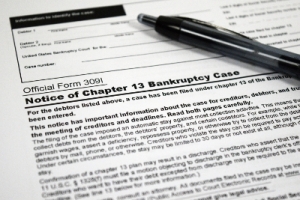Chapter 13 Bankruptcy Case
A person who is in debt and does not have the financial means of paying down that debt may need to file for bankruptcy. Bankruptcy, while not right for everyone, may help discharge some debt and restructure other debt to the extent where he or she can satisfy past-due debt while making current payments. Although there are many options, Chapter 13 bankruptcy cases are an important tool for many people in financial crisis, especially if there are secured assets or non-exempt property that the debtor wishes to keep.
A Chapter 13 case provides an opportunity for a person to negotiate with creditors in order to restructure or discharge debt. A Chapter 13 bankruptcy case involves a repayment plan that extends over a period of three to five years. The plan may involve the full or partial repayment of some debt while other debt will be discharged at the close of the bankruptcy case. The plan is based on anticipated future income of the individual filing and the capacity to satisfy the debt. In order to recover some of the money that the individual owes, many creditors are willing to accept a partial payment, which is why Chapter 13 bankruptcy negotiation is so effective. This allows a person to manage the payments based on available income.
There are many reasons to pursue a Chapter 13 case, but some of the most common ones include the following:
-
Preventing a creditor from foreclosing on a home;
-
Stopping a car from being repossessed;
-
Negotiating a repayment plan for back taxes, including local, state, and federal taxes;
-
Retaining possession of non-exempt property that would have to be liquidated in a Chapter 7 bankruptcy action; and
-
Creating an affordable repayment plan in order to halt harassing contact from creditors.
A person often chooses a Chapter 13 bankruptcy case rather than a Chapter 7 action because he exceeds the income limits required to file for Chapter 7 or has secured assets that he or she wants to protect. A person must satisfy the terms of the repayment plan in order to have all other debt discharged at the end of the predetermined time period.
The amount of debt that is included in the repayment plan is set by an analysis of the person’s income, assets, and liabilities. There is a Means Test that establishes the amount of disposable income that a person will have available to pay on his financial obligations, which is used to shape the repayment plan. The creditors involved in the Chapter 13 also must receive at least as much money as they would have received if the individual had pursued a Chapter 7 bankruptcy instead of a Chapter 13.
Before a person can file any type of bankruptcy action, he or she must complete a credit counseling course with an approved counseling agency. This is intended to provide a person with the skills necessary to more effectively manage financial matters moving forward. It is important to consult with an experienced bankruptcy attorney before taking any action because of all the requirements and the potential for a case to be dismissed if there were any mistakes with the filing.
 The bankruptcy process has become much more complex since the passage of the Bankruptcy Abuse Prevention and Consumer Protection Act in 1995. Although the act was purportedly intended to prevent individuals from fraudulently taking advantage of the bankruptcy system, it actually made it more difficult for people who desperately need the protections of bankruptcy to obtain the relief intended in the Bankruptcy Code. Skilled attorneys can help a person navigate the complexities of a bankruptcy case, whether it is Chapter 13 or Chapter 7. There is a filing fee to submit a Chapter 13 petition and start the process of reorganizing debt, along with other associated costs, so it is important to ensure that the filing is successful. However, the protections of the bankruptcy filing, including the automatic stay that prevents creditors from harassing the person who owes the money, is worth the effort when it is done properly.
The bankruptcy process has become much more complex since the passage of the Bankruptcy Abuse Prevention and Consumer Protection Act in 1995. Although the act was purportedly intended to prevent individuals from fraudulently taking advantage of the bankruptcy system, it actually made it more difficult for people who desperately need the protections of bankruptcy to obtain the relief intended in the Bankruptcy Code. Skilled attorneys can help a person navigate the complexities of a bankruptcy case, whether it is Chapter 13 or Chapter 7. There is a filing fee to submit a Chapter 13 petition and start the process of reorganizing debt, along with other associated costs, so it is important to ensure that the filing is successful. However, the protections of the bankruptcy filing, including the automatic stay that prevents creditors from harassing the person who owes the money, is worth the effort when it is done properly.
If you live in the Chicago area, a skilled Illinois bankruptcy attorney is ready to assist you with the bankruptcy filing that is right for you. Call AZ Debt Relief Group, PLLC at (602)-466-9631 to schedule an appointment. Often, we can answer many of your questions over the telephone.
